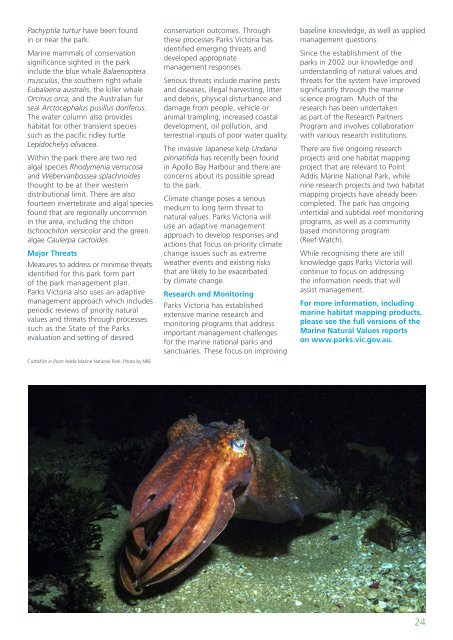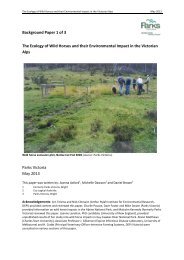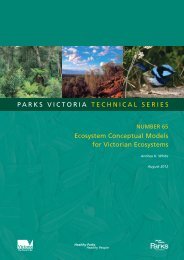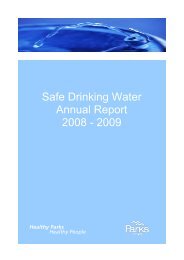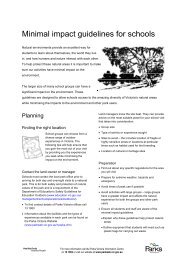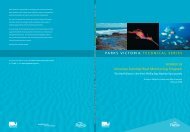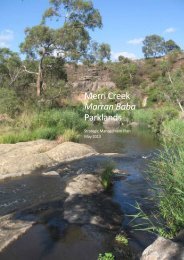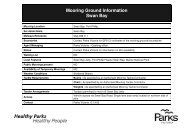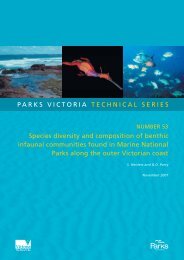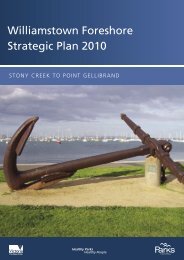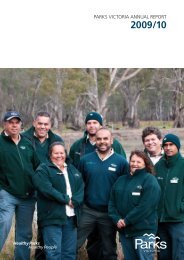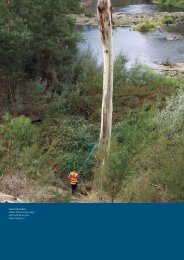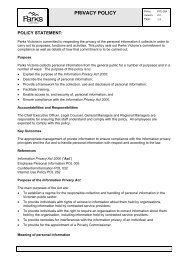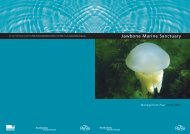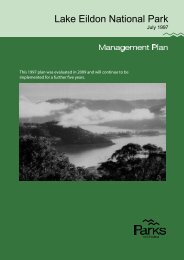Marine Natural Values Study Summary - Parks Victoria
Marine Natural Values Study Summary - Parks Victoria
Marine Natural Values Study Summary - Parks Victoria
Create successful ePaper yourself
Turn your PDF publications into a flip-book with our unique Google optimized e-Paper software.
Pachyptila turtur have been foundin or near the park.<strong>Marine</strong> mammals of conservationsignificance sighted in the parkinclude the blue whale Balaenopteramusculus, the southern right whaleEubalaena australis, the killer whaleOrcinus orca, and the Australian furseal Arctocephalus pusillus doriferus.The water column also provideshabitat for other transient speciessuch as the pacific ridley turtleLepidochelys olivacea.Within the park there are two redalgal species Rhodymenia verrucosaand Webervanbossea splachnoidesthought to be at their westerndistributional limit. There are alsofourteen invertebrate and algal speciesfound that are regionally uncommonin the area, including the chitonIschnochiton versicolor and the greenalgae Caulerpa cactoides.Major ThreatsMeasures to address or minimise threatsidentified for this park form partof the park management plan.<strong>Parks</strong> <strong>Victoria</strong> also uses an adaptivemanagement approach which includesperiodic reviews of priority naturalvalues and threats through processessuch as the State of the <strong>Parks</strong>evaluation and setting of desiredCuttlefish in Point Addis <strong>Marine</strong> National Park. Photo by NRE.conservation outcomes. Throughthese processes <strong>Parks</strong> <strong>Victoria</strong> hasidentified emerging threats anddeveloped appropriatemanagement responses.Serious threats include marine pestsand diseases, illegal harvesting, litterand debris, physical disturbance anddamage from people, vehicle oranimal trampling, increased coastaldevelopment, oil pollution, andterrestrial inputs of poor water quality.The invasive Japanese kelp Undariapinnatifida has recently been foundin Apollo Bay Harbour and there areconcerns about its possible spreadto the park.Climate change poses a seriousmedium to long term threat tonatural values. <strong>Parks</strong> <strong>Victoria</strong> willuse an adaptive managementapproach to develop responses andactions that focus on priority climatechange issues such as extremeweather events and existing risksthat are likely to be exacerbatedby climate change.Research and Monitoring<strong>Parks</strong> <strong>Victoria</strong> has establishedextensive marine research andmonitoring programs that addressimportant management challengesfor the marine national parks andsanctuaries. These focus on improvingbaseline knowledge, as well as appliedmanagement questions.Since the establishment of theparks in 2002 our knowledge andunderstanding of natural values andthreats for the system have improvedsignificantly through the marinescience program. Much of theresearch has been undertakenas part of the Research PartnersProgram and involves collaborationwith various research institutions.There are five ongoing researchprojects and one habitat mappingproject that are relevant to PointAddis <strong>Marine</strong> National Park, whilenine research projects and two habitatmapping projects have already beencompleted. The park has ongoingintertidal and subtidal reef monitoringprograms, as well as a communitybased monitoring program(Reef Watch).While recognising there are stillknowledge gaps <strong>Parks</strong> <strong>Victoria</strong> willcontinue to focus on addressingthe information needs that willassist management.For more information, includingmarine habitat mapping products,please see the full versions of the<strong>Marine</strong> <strong>Natural</strong> <strong>Values</strong> reportson www.parks.vic.gov.au.24


